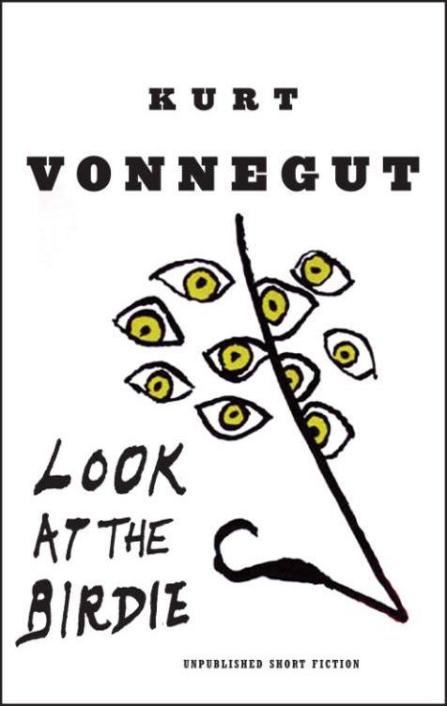
Look at the Birdie
Unpublished Short Fiction
کتاب های مرتبط
- اطلاعات
- نقد و بررسی
- دیدگاه کاربران
نقد و بررسی

August 24, 2009
This collection of unpublished fiction sheds light on Vonnegut's early writing, but fails to measure up to the rest of his formidable oeuvre. The stories are brief, vividly imagined and sometimes carry a science-fictional twist with a moral (of sorts), not unlike “Harrison Bergeron.” In “Confido,” for instance, an inventor manufactures a device that whispers to its users everything they want to hear, with special emphasis on their worst desires and suspicions, while the title story describes an interaction at a bar between a disgruntled man and a self-styled “murder counselor” who has come up with an ingenious method for killing people. Sidney Offit, Vonnegut's longtime friend, notes in an introduction that it's possible these stories went unpublished because they didn't satisfy the author. To be sure, they lack the polish and humor of the author's best-known work. Nevertheless, for devotees, they provide an instructive view of Vonnegut's talent in the making.

September 15, 2009
Early, unpublished work from the much-lauded and much-loved American writer.
The foreword by his friend Sidney Offit portrays Vonnegut (1922–2007) as being in his private life very much like the man we know from his fiction: a gimlet-eyed, cantankerous, but always openhearted observer of the human condition. Readers will discover traces of that Vonnegut here. In"Shout About It from the Housetops," a traveling salesman who finds himself in the middle of an embattled couple's marital drama thinks,"I was sure now that both the husband and wife were crazy, and that, if there were any children, the children would be crazy as bedbugs, too. There obviously wasn't anybody around who could be counted on to make regular payments on storm windows." These words capture both the character and the callous earnestness of a low-level capitalist. It's also clear that Vonnegut's gift for believably absurd monikers emerged early; anyone who admires the singular genius of the name Kilgore Trout will likely appreciate Fuzz Littler and K. Hollomon Weems. But despite the occasional flickers of brilliance, the collection as a whole is not very good. Offit mentions O. Henry in his foreword, but The Twilight Zone would be a more apt comparison; the stories' unvarying structure—setup followed by shocking twist—is strikingly similar to that of the TV show. Though obviously of value to anyone interested in Vonnegut's artistic development, this edition suffers from a lack of context. The pieces are not dated, nor are we told whether they went unpublished because they were rejected or because the author was dissatisfied with them.
For ultra-committed fans and Vonnegut scholars only.
(COPYRIGHT (2009) KIRKUS REVIEWS/NIELSEN BUSINESS MEDIA, INC. ALL RIGHTS RESERVED.)

September 1, 2009
This is the third collection of Vonnegut's early work, following "Bagombo Snuff Box" (1999) and "Armageddon in Retrospect" (2008). Most of the stories are typical examples of late 1950s black humor. "Confido" is an audio device that whispers a bitchy commentary on the shortcomings of the owner's real friends, like an inner Joan Rivers. In "Fubar," a marginalized office worker's life is upended by a new secretary from the Girl Pool. In "Hall of Mirrors," two detectives match wits with a hypnotist suspected of murder. All of the stories feel dated, and reading them is similar to watching reruns of old black-and-white TV shows. Vonnegut's America is almost unrecognizable: low tech, mostly blue collar, but with an underlying weirdness, as in Philip K. Dick's work from the same period. But the voice is clearly Vonnegut's (as are the illustrations), and that should be enough to win over fans. VERDICT These early stories lack the polish of Vonnegut's classic novels but track the development of his hugely influential mix of sf and black humor. Important for fans, but first-time readers should start with the better-known titles. [See Prepub Alert, "LJ" 7/09.]Edward B. St. John, Loyola Law Sch. Lib., Los Angeles
Copyright 2009 Library Journal, LLC Used with permission.

September 15, 2009
Before his novels made him famous, Vonnegut wrote stories for the slickslarge-format, general-interest magazines, such as Saturday Evening Post, Colliers, and Womans Home Companion. These 14 examples of that portion of his output, however, only now see the light of print. All are in the sort of pop-Hemingway prose Vonnegut continued to use, tinged with ad-speak, in the novels and are unpleasant only in their sometimes willful-seeming happy endings. The two-part Ed Lubys Key Club, about a hardworking couple that, out to celebrate a wedding anniversary, stumbles into a hell of urban corruption, is Brechtianly impressive until its nicey-nice, unironic resolution. The satirical sf tales Confido, The Nice Little People, and The Petrified Ants forecast the novels more obviously and share the twisted O. Henry procedures that flowered in popular fiction and in the typical Twilight Zone episode. There is satire, too, in other, more mainstream stories aimed at targets including communism, class privilege, IQ-worship, and abortion, which is addressed in quasi-feminist fashion. Everything here entertains, perhaps surprisingly.(Reprinted with permission of Booklist, copyright 2009, American Library Association.)

























دیدگاه کاربران